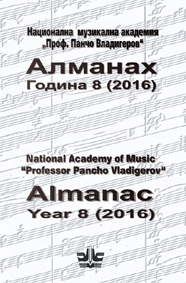Sprachkomposition К. Штокхаузена „Stimmung“ как знак времени
Karlheinz Stockhausen’s “Stimmung” Sprachkomposition as a Sign of Its Time
Author(s): Ludmila LeipsonSubject(s): Fine Arts / Performing Arts, Music
Published by: Издателство НМА „Проф. Панчо Владигеров”
Keywords: Sprachkomposition; Stockhausen; contemporary phonetics; partial tone singing throat singing; formula
Summary/Abstract: At the second half of the 50s of the 20th century, a certain kind of compositions appear, that in German musical language are called “Sprachkomposition” (“language composition”). They are characterized with musical phoneme usage, and their acoustic features as a building material, thus creating a completely new form of musical thought. Stockhausen is considered the pioneer in this field – he has created numerous works of this kind – including “Gesang der jünglinge” (1956), “Moments” (1962 – 1969), “Stimmung” (1968). This article aims to analyze the aleatoric score of “Stimmung” in light of the political, societal and art tendencies of the 60s of the 20th century, and also to tell the incredibly dramatic story of its performance up until the beginning of the new millennium. Particular interest deserves enlightening the little-known music history fact: Stockhausen’s influence on Werner Meyer-Eppler – a scientist-phonetician, a pioneer in the theory of information and the psychological aspect of phonetic communication interaction, a lecturer in the Darmstadt courses and an initiator of the first electronic music studio in Germany.
Journal: Алманах - Национална музикална академия „Проф. Панчо Владигеров“
- Issue Year: 2017
- Issue No: 8
- Page Range: 100-115
- Page Count: 16
- Language: Russian

